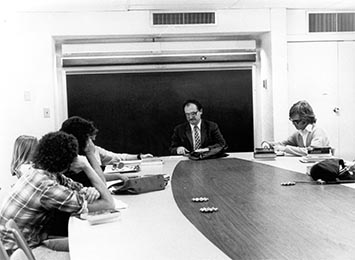 Medieval and Renaissance Historian, Pioneer in Macrohistory
Medieval and Renaissance Historian, Pioneer in Macrohistory
Lee Daniel Snyder, professor emeritus of history at New College of Florida, Sarasota, died on September 9, 2012, after a battle with Alzheimer’s disease. He was best known on campus for the wide range of European history courses he taught and in the discipline for the college’s biannual conference in medieval and Renaissance studies and his work in macrohistory.
The son of a metallurgist, Snyder was born on June 4, 1933, in Waterbury, Connecticut, and raised in Hastings-on-Hudson, New York. In 1955, he graduated summa cum laude from Williams College, where he was elected to Phi Beta Kappa and was class valedictorian. He received the MDiv degree cum laude in 1961 from Union Theological Seminary in New York, followed by an MA in 1956 and a PhD in 1966, both from Harvard. While in graduate school, he was a Danforth Fellow, and at Union he won the Hitchcock Prize in Church History. A student of Myron Gilmore, he wrote a dissertation titled “Wessel Gansfort and the Art of Meditation.” In 1956–57 he was a Fulbright scholar at Gutenberg University in Mainz.
His academic posts included assistant professor at Ithaca College (1963–64), the same rank at Ohio Wesleyan University (1964–69), and assistant and then full professor at New College of Florida (1969–2003), where he was also director of medieval and Renaissance studies. He led European workshops in Poiters, Perugia, and Florence. In 1990 he was an exchange professor at New College, Oxford. He received summer fellowships from the National Endowment for the Humanities that permitted him to study at such institutions as Yale, Brown, Dartmouth, Duke, Arizona State, and the University of California at Berkeley. He also served on NEH selection panels.
A pioneer in the field of macrohistory, Snyder served as president of the International Society for the Comparative Study of Civilizations from 2004 to 2007. In his book Macro-History: A Theoretical Approach to Comparative World History (1999), Snyder wrote: “Macro-history is an attempt to create a model of the cultural-historical process that will explain historical change for all societies-civilizations. . . . It was developed as an alternative to the various myths of progress current in the West from Liberalism to Marxism and should be tested both empirically and theoretically.”
Snyder’s articles appeared in such journals as Encounter, Renaissance and Reformation, Fifteenth Century Studies, and the Indiana Journal of Hispanic Literature. He also presented at least 30 papers at various conferences.
As director of medieval and Renaissance studies, Snyder directed the New College Conference on Medieval-Renaissance Studies from 1977 to 2003. The conference, which the college continues to sponsor every other year, draws several hundred scholars from a variety of disciplines, including literature and art history. In the early years, before the advent of e-mail and word processing, Snyder worked almost alone to launch this highly successful meeting. For Snyder such efforts were not new, as he had organized conferences at Ohio Wesleyan on the Reformation and on Methodism and social reform.
Such intense professional activity did not come at the expense of his teaching but rather enhanced it. At New College, Snyder showed himself to be a dedicated and able teacher, at home in a variety of fields. He conducted biannual courses on such topics as the New Testament, early Christianity, medieval France and Spain, medieval Germany and Italy, the Italian Renaissance, and the German Reformation. Among his most popular courses were those on macrohistory, Dante, Islamic civilization, and the history of education.
An ordained Methodist minister, Snyder played the crucial role in establishing Sarasota Association for Campus Ministry, a chaplaincy program that now serves three campuses: New College of Florida, Ringling College of Art and Design, and the University of South Florida Sarasota-Manatee. He established the ministry in the mid-1970s and often served as board president. He was also a leader in Sarasota’s Crossroads (formerly North United Methodist Church), where he did much preaching and adult teaching.
Snyder had a warm and engaging personality and wore his learning lightly. He is survived by his wife of 51 years, Anne Given Snyder; his daughter, Rebecca, who is a political scientist; and his son Timothy, an architect.
Justus D. Doenecke
New College of Florida
Tags: In Memoriam
Comment
Please read our commenting and letters policy before submitting.






